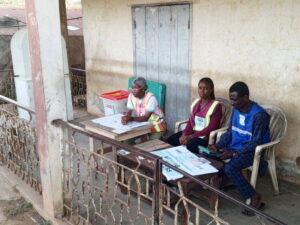One dies as Nigeria records 21 cases of monkeypox – NCDC
Nigeria has recorded 21 confirmed cases of the Monkeypox disease in the last five months with one death according to the Nigeria Centre for Disease Control (NCDC).
The NCDC further disclosed that in the month of May, only six new confirmed positive cases were reported from four States with Bayelsa (2), Adamawa (2), Lagos (1) and Rivers (1).
Also 20 suspected cases were reported from eleven States with Lagos (5), Bayelsa (2), Adamawa (2), Rivers (2), Niger (2), FCT (2), Delta (1), Oyo (1), Kaduna (1), Edo (1) and Gombe (1).
A 40- year-old man with renal co-morbidity and on immune-suppressive drugs died from the disease.
The agency revealed that from September 2017 to May 29th, 2022, 578 suspected cases have been reported from 32 States.
Of the reported cases, 247 (42.7 per cent) have been confirmed in 22 states – Rivers (53), Bayelsa (45), Lagos (34), Delta (31), Cross River (16), Edo (10), Imo (9), Akwa Ibom (7), Oyo (6), FCT (8), Enugu (4), Abia (3), Plateau (3), Adamawa (5), Nasarawa (2), Benue (2), Anambra (2), Ekiti (2), Kano (2), Ebonyi (1), Niger (1) and Ogun (1).
Also, nine deaths have been recorded (case fatality ratio (CFR) = 3.6 per cent) in six states, namely Lagos (3), Edo (2), Imo (1), Cross River (1), FCT (1) and Rivers (1) from September 2017 to May 29th, 2022.
The NCDC was notified by the United Kingdom (UK) International Health Regulations (IHR) focal point about the case of exported monkeypox from Nigeria on 7 May 2022. The case was confirmed on 6 May 2022. The patient visited Nigeria between April 20th and May 3rd 2022.
The NCDC disclosed that although Nigeria’s risk of exposure to the Monkeypox virus is high based on the recent risk assessment conducted, however, the current situation in-country and globally has shown no significant threat to life or the community that can result in severe disease or high case fatality rate.
While stating that its Emergency Operations Center (EOC) will continue to monitor the evolving situation to inform public health action accordingly, the NCDC emphasises that members of the public should remain aware of the risk of Monkeypox and adhere to public health safety measures – specifically, report to the nearest health facility if they notice the known signs and symptoms of the disease.
It also urged healthcare workers to maintain a high index of suspicion for Monkeypox and report any suspected case to the relevant state Epidemiology Team for prompt public health intervention, including sampling for confirmatory testing.
“The One Health Animal Surveillance team including Federal Ministry of Agriculture and Rural Development, Federal Ministry of Environment, National Veterinary Research Institute and partners commenced operational research on Monkeypox virus prevalence in small mammals at the human-animal interface since October 2018. This research has been completed in 7 states with a planned roll out in all other states to commence soon,” it said.
Globally, according to reports from the World Health Organization (WHO), as of 26 May, there have been a cumulative total of 257 laboratory confirmed cases, with around 120 suspected cases reported, from 23 non-endemic countries. However, no deaths have been reported.
The countries are – Argentina, Canada, French Guiana, United States of America, United Arab Emirates, Sudan, Austria, Belgium, Czechia, Denmark, Finland, France, Germany, Israel, Italy, Netherlands, Portugal, Slovenia, Spain, Sweden, Switzerland, United Kingdom of Great Britain, Northern Ireland, and Australia.
The WHO noted that while the situation is evolving rapidly, it expects that there will be more cases identified as surveillance expands in non-endemic countries, as well as in countries known to be endemic who have not recently been reporting cases.
Monkeypox is a viral zoonosis (a virus transmitted to humans from animals) with symptoms very similar to those seen in the past in smallpox patients, although it is clinically less severe.
Monkeypox virus is transmitted from one person to another by close contact with lesions, body fluids, respiratory droplets and contaminated materials such as bedding. The incubation period of monkeypox is usually from 6 to 13 days, but can range from 5 to 21 days.
The WHO stated that various animal species have been identified as susceptible to the monkeypox virus. Uncertainty remains on the natural history of the monkeypox virus and further studies are needed to identify the reservoir(s) and how virus circulation is maintained in nature. Eating inadequately cooked meat and other animal products of infected animals is a possible risk factor.














Post Comment